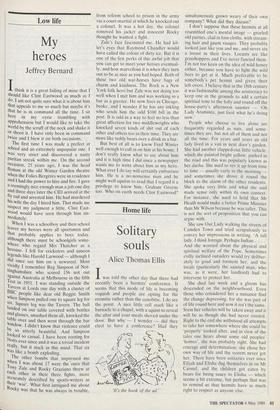Home life
Solitary
souls
Alice Thomas Ellis
Iwas told the other day that there had recently been a hermits' conference. It seems that this mode of life is becoming voguish and people are opting for the eremitic rather than the cenobitic. I do see the point. A nice little cell stuck like a barnacle to a chapel, with a squint to reveal the altar and your meals shoved under the door. But why — I wonder — did they elect to have a conference? Had they
it's the book of the ad.' simultaneously grown weary of their own company? What did they discuss?
I don't suppose that these hermits at all resembled one's mental image — gnarled old parties, clad in loin-cloths, with stream- ing hair and gaunt visages. They probably looked just like you and me, and never ate a locust in their lives. Locusts are like grasshoppers and I've never fancied them. I'm not too keen on the idea of wild honey either, because you have to fight the wild bees to get at it. Much preferable to be somebody's pet hermit and given their left-overs. I believe that in the 18th century it was fashionable among the aristocracy to keep one in the grounds to add a certain spiritual tone to the folly and round off the house-party's afternoon saunter — 'Oh Lady Araminta, just look what he's doing now.'
People who choose to live alone are frequently regarded as nuts, and some- times they are, but not all of them and not all the time. For years and years an old lady lived in a van in next door's garden. She had another clapped-out little vehicle, which she painted bright yellow, parked in the road and this was popularly known as her dacha. She used to rev it up from time to time — usually early in the morning — and sometimes she drove it round the block to the alarm of the other residents. She spoke very little and what she said made sense only within its own context. For instance, she used to hold that Mr Heath would make a better Prime Minister than Mr Wilson because he was taller. This is not the sort of proposition that you can argue with.
She saw Our Lady walking the streets of Camden Town and tried scrupulously to convey her impressions in writing. 'A tall lady. [think foreign. Perhaps Indian . . . And she worried about the physical and spiritual welfare of the Pope. Sometimes evilly inclined outsiders would try deliber- ately to goad and torment her, and the locals (particularly the sainted man, who was, as it were, her landlord) had to intervene to protect her.
She died last week and a gloom has descended on the neighbourhood. Even those who considered her a nuisance find the change depressing, for she was part of of life round here and now it isn't the same. Soon her vehicles will be taken away and it' will be as though she had never existed. Right to the end she withstood all attempts to take her somewhere where she could be 'properly' looked after, and in view of the tales one hears about some old peoples' 'homes'. she was probably right. She had courage and determination; she chose her own way of life and the system never got her. There have been solitaries ever since Elijah and Elisha dug themselves in on Mt Carmel, and the children got eaten by bears for being saucy to Elisha — which seems a bit extreme, but perhaps that was to remind us that hermits have as much right to respect as anyone else.


















































 Previous page
Previous page